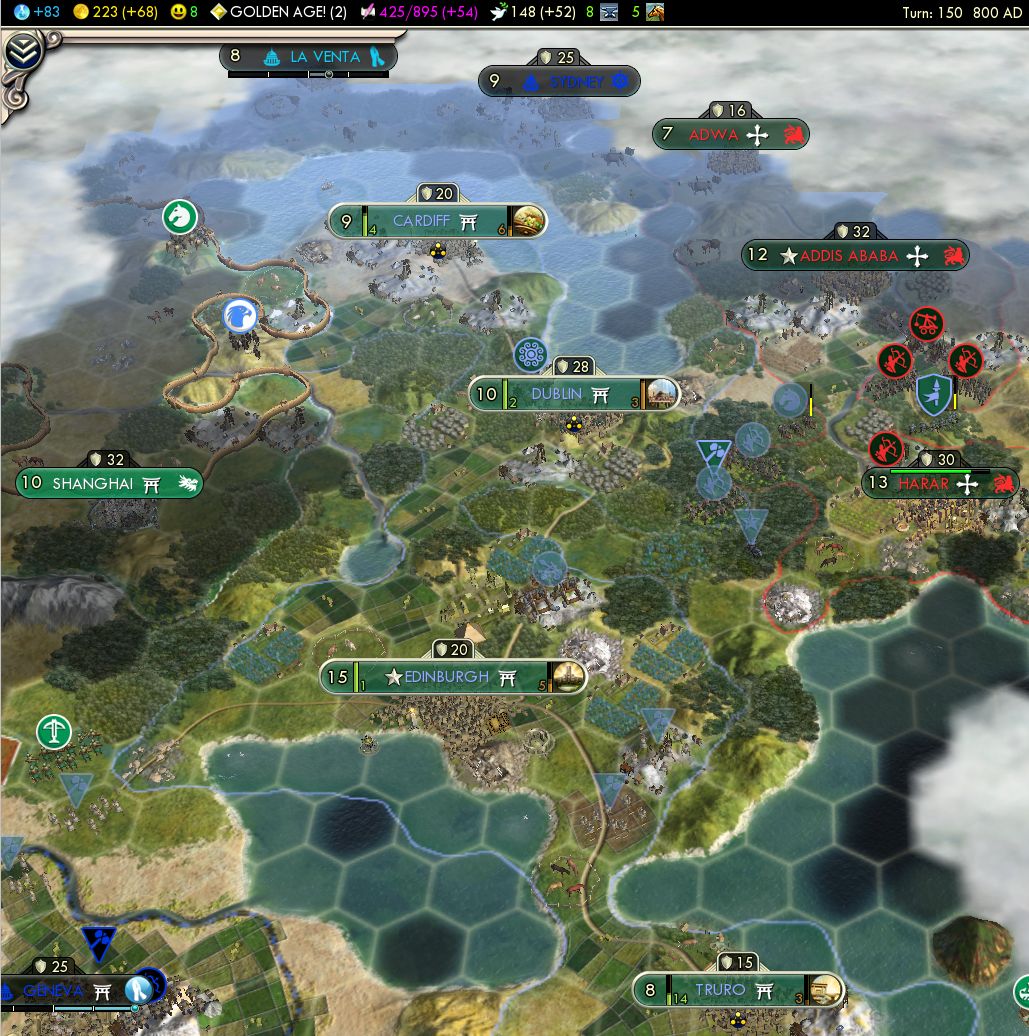
That's enough about religion, so now back to the game. Unusually for a culture plan, I ran up the bottom branch of the tree first, to Fertilizer, which I took with Oxford. This is about the only time I'll ever play culture without racing for a fast finish. Just trying to build a generally strong civ that happens to win by culture. Fertilizer for the food bonus was the right call, especially given how little fresh water my entire civ had.
A second Great Engineer popped from my capital. The best use was to clock the Porcelain Tower, in my southernmost city because it needed a wonder to qualify for the Reformation policy culture bonus. And this was well timed, getting the PT just before my first couple research agreements matured. Also speaking of good timing, that slingshot to Fertilizer opened the Freedom social policy tree, and now I could convert all that surplus faith into a Great Artist.
By the way, now I crystallized what I do like so much about Civ 5. My favorite experiences in all these strategy games come when weaving together many disparate threads into a coherent whole. And Civ 5 has a LOT of interlocking such subsystems. Happiness, culture, social policies, great people, the sharp breakpoints on era boundaries, city-states and now religion. Even though this interweaving often just happens on autopilot in Civ 5 (like, the Louvre always comes just about when you finish Freedom), it is indeed enjoyable. Civ 5 can still get me one-more-turning in a way that Civ 4 no longer can.
Speaking of subsystems, it is time for an introduction to espionage. I'd been given a spy on entering the Renaissance era (and another for the Industrial era, another reason for that Fertilizer slingshot) which parked in an enemy city. A whole bunch of turns later, I got a notice saying that a technology steal was possible.
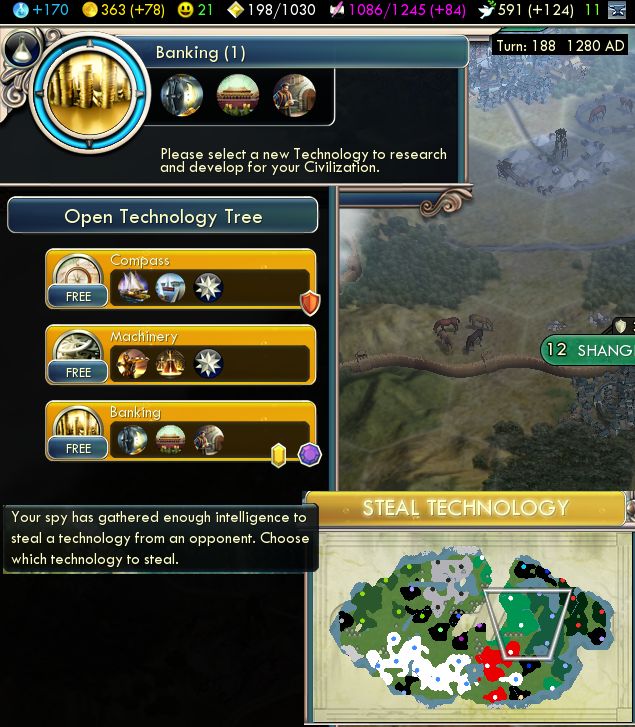
And, apparently, mandatory. I see no way to cancel that steal order, or to wait on it. Even telling the spy to move back home didn't cancel that. What if I don't want to risk angering my neighbor? (Oh right, this is Civ 5, your neighbors are always angry and pose no threat even if they are.) Okay, so I took Machinery, the more expensive option that I wasn't already researching. Later I added a steal of Industrialization too.
I like the simplification of the spying system compared to Civ 4, but it may have gone too far. Once again, just like everything else in Civ 5, you don't make things happen, you sit back while things happen to you. You click a spy into an enemy city, wait thirty turns, and poof tech. There's no strategic depth like all the other spy missions in Civ 4 or managing EP production against competing opportunity costs. I guess Civ 5 spies don't hurt the game (surely not more than Research Agreements, or the more brutal missions in Civ 4), but it feels like a tick mark next to "Features: Espionage" on the box.
So I proceeded with developing culture. One difficulty was the absence of cultured city-states on the entire board! The only one, Warsaw, got captured by Ethiopia. Anyway, I naturally finished Tradition, Piety, and Freedom. What next? I guess it has to be Liberty, silly as that is in the later game, but the Representation cost reducer is mandatory as bigger than anything for culture in Honor, Patronage, or Commerce. (And the Liberty opener also added 10 cpt by itself after multipliers.) And the Liberty finisher is another Great Artist Landmark.
Skipping over some dull Industrial Age researching, eventually my beeline arrived at Radio for Broadcast Towers and more culture. Then Plastics for Cristo Redentor. (Does that make sense? Isn't the Cristo Redentor a big metal statue? Definitely not plastic.) I did collect a number of research agreements, having gotten friendship agreements from four civs, and kept RAs active with them at all times. Just like vanilla Civ 5, the RAs accounted for just about as many beakers as my natural research. I added the Statue of Liberty, worthwhile with 20 artist specialists going in the empire. (1000 hammers for +1 hammer per specialist is not worthwhile if you will not experience 1,000 specialist-turns before game end.)
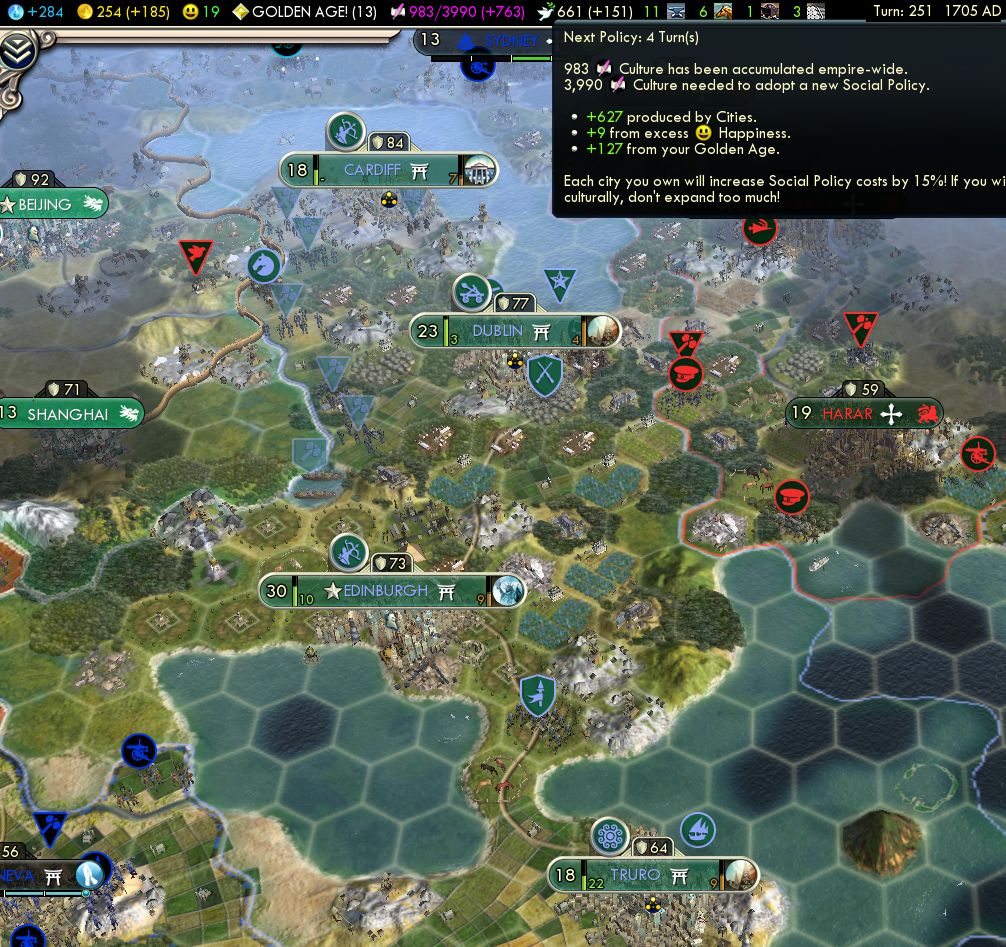
Another overview. Of course I had already won twenty turns ago in my Greece game, but that's not comparable to this. No way a game with only four Research Agreement partners can keep up with a game with nine. And this map lacks any cultured CS. But the culture trajectory still remains similar, just later. +800/turn is the usual terminal velocity, with the capital providing 500 of that.
Also, what's that +127 from Golden Age, since when does a Golden Age produce extra culture? That's new, right? What's the mechanics for that? The Civilopedia page on Culture says nothing about a Golden Age. Finally I found it by searching for Golden Age in the civilopedia, which shows up under Great Artist, and says empire-wide culture is increased 20%. That is certainly useful to know. Hey, that late Golden Age from the Liberty policy would indeed prove useful after all. (The current GA is the third happiness GA.)
Around this time I stopped growing the cities, letting them stagnate until the end of the game. 200 food to grow Dublin another size, and over 250 for Edinburgh. Those could be 200 hammers instead by shifting tiles*, and obviously something like a 200-hammer bank pays out more now than adding a single citizen. I still want to produce a rigorous treatment of when to give up on the brutal growth cost and ignore food forevermore.
*(In Civ 5, food and hammers are almost always 1:1 equivalent to produce, you can almost always reassign off a food tile to a hammer tile in equal quantity. The only constraint is the number of hammer (hill or forest) tiles within range of a city. And in the late game, even that cap lifts by way of Engineer specialists enhanced by Statue of Liberty and Civil Society. They are functionally 1F 3H citizens, equivalent to lumbermill tiles.)
Also, I presently noticed that I hadn't had to think about happiness the entire game. Never once dipped into anger, never traded for luxuries or built any circuses or theaters or anything, and in fact I got three happiness Golden Ages without even trying. Where did that happiness come from? Religion was part of it with the cathedrals and pagodas, but I'm really not quite sure why this constraint never materialized.
Also BTW, I was trying to strike a balance on the fairness of taking gold from AIs. I did not aggressively sell resources for every penny they could deliver, but I'd take gold when thrown in on some other deal or for a peace treaty. Still thinking about a good way to balance that.

Hey, that is interesting. Spies can tell you when another civ plans a sneak attack. Although, that strikes me as very oddly emulsifying the spy system with the AI strategy layer. This is only possible because the code to process spies can access the inside of the AIs' brains. It is impossible against a human player to divine his sneak attack intentions. Maybe I'm too much of a programmer, but this struck me like suddenly seeing through the Matrix in a very jarring way.
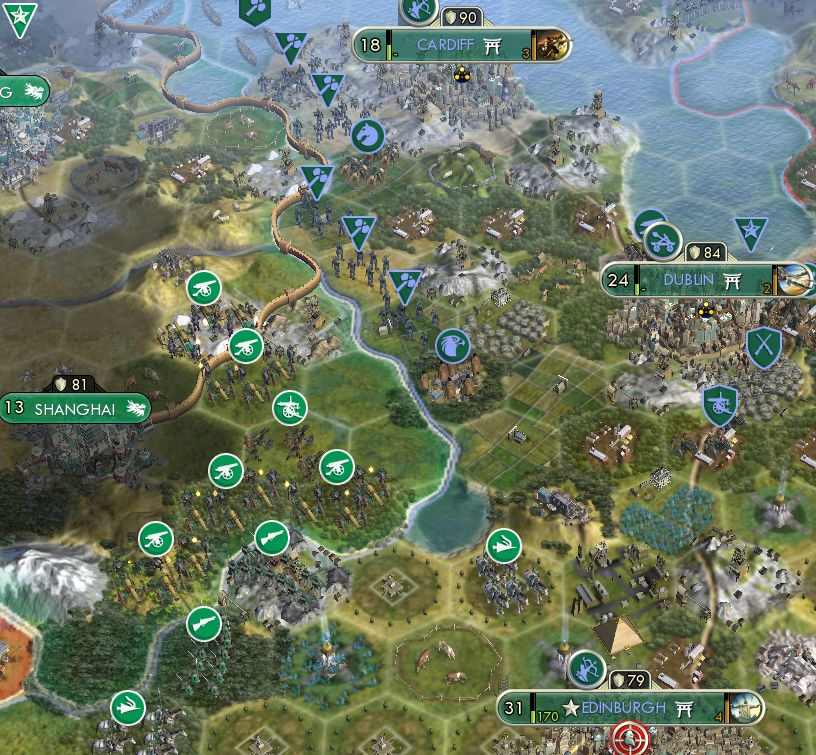
Anyway, of course the warning was correct. I'd started prebuilding some aircraft and infantry, and now began upgrading all those older units through the strata to infantry and gatling guns. Eventually 70-strength Infantry easily held off those cannons, gatlings, and riflemen at 20/30/34 strength. China had the upper hand with air power at first, but then one Triplane of mine shot down several bombers and that was that.
After chewing through a dozen units, I started preparing to take the fight to Shanghai. As I was about to invade...
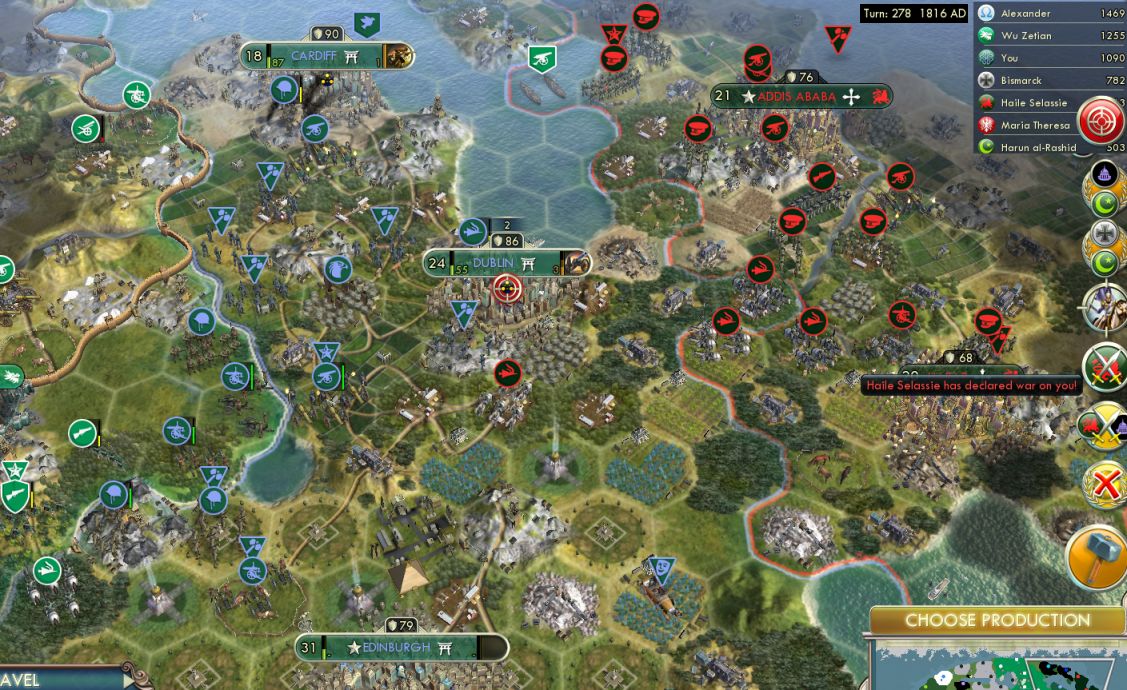
naturally Haile backstabbed me from the other direction. Fortunately, China was just now ready to pay for peace. Haile was less advanced (those hat icons are a rifleman UU), lacking Flight and Artillery and infantry, so this was easy.
These wars were actually rather fun. Civ 5's design actually works here, that we were fighting with 10-12 units on each side and not seventy as in Civ 4 or 3. And I like the idea of World War I units, that's not something you see in every strategy game. Triplanes and "Great War Bombers" represent a much better historical picture than Civ 4's Airship units, which in reality were too slow and vulnerable for much use in war. Civ games have never before captured the early era of aviation before World War II but now we finally have.
Although in mechanics terms, those bombers might be rather too powerful. They're like artillery with 6 range and no time lost in moving and setting up. And their promotions are crazy strong: land siege gets conditional +15% boosts (vs open or rough terrain), but bombers get +33% vs all land units! Against a foe without Flight, you can win pretty much entirely with bombers and nothing else.

Anyway, I grinded my way in to finally capture Harar. This was to proceed to Warsaw, which I wanted to liberate so it could supply me city-state culture. But I never got the option? It just became a normal city under my control... but my culture costs didn't go up? The heck? Then I noticed the same thing had happened at Harar, which I wanted to puppet, but never got that option either.
What's going on here? Turns out that two threads on Civfanatics say this is a bug!
http://forums.civfanatics.com/showthread.php?t=479506
http://forums.civfanatics.com/showthread.php?t=479391
It affects many types of popup windows, including city-state greetings, which is why I never got told of the religious CS faith award at the beginning of the game. The solution is to get Steam to revalidate the game files.

That could be a problem! How the bloody hell does this happen?!
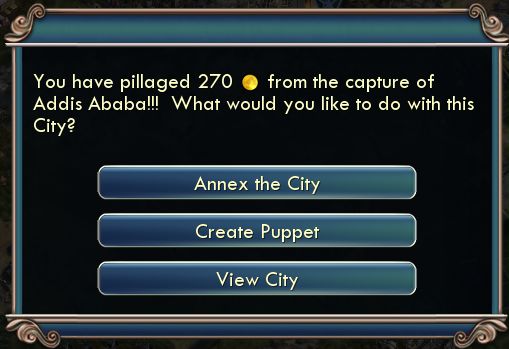
That's better. Although it might have been nicer to keep that bug! Now the game did recalculate the culture costs with my two added cities, which obviously isn't something you'd ever intentionally do late in a culture game. Anyway, now I took peace.
My next discovery was that Gods & Kings slows down the later game a LOT. There are more techs on the tree, and it takes infinity longer to research all those 7000 beaker lumps when you don't have nine saved Great Scientists. And my empire is not a slackard on science, I did build up to Public Schools. But it still takes 18-20 turns for every one of these techs. I'll skip over a hundred turns of boring research, to when Ecology for the Sydney Opera House finally rolled in at the very late date of turn 310 1880 AD.
Addis Ababa had come with the Leaning Tower of Pisa (+25% GP generation), which helped push out a Great Engineer from my capital perfectly timed to rush SOH for the last social policy free. I also timed it for one last Great Artist on the same turn, for a Golden Age to help build the Utopia Project.

Cultural Victory on turn 329, 1909 AD. Virtually 100 turns slower than my best performance. Obviously this map and civ weren't really targeted for speed, and more generally speed results from Gods & Kings will not be competitive with the vanilla game, with more techs and fewer shortcuts. But I will be back for another try.